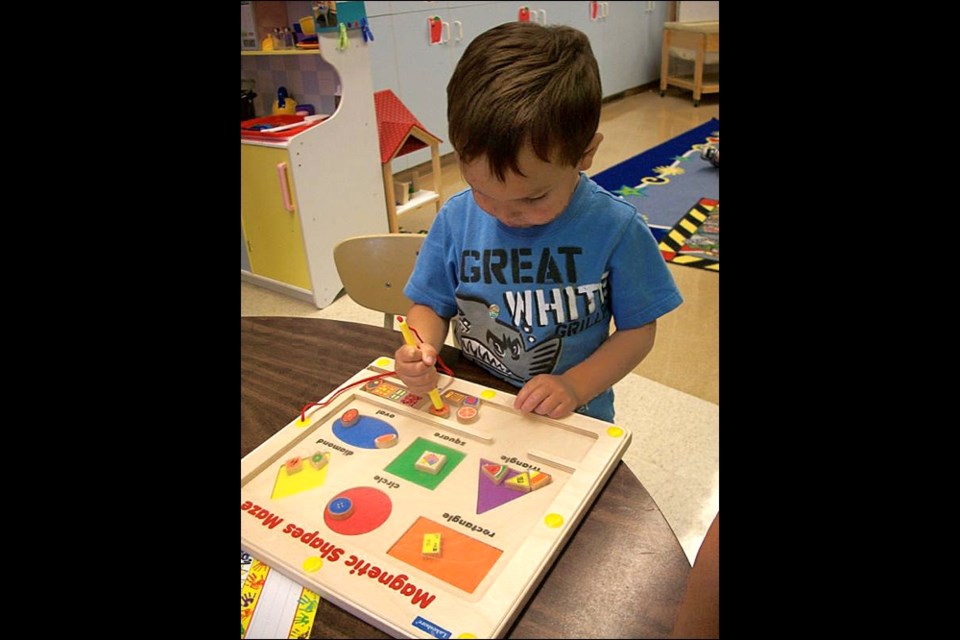There are spaces still open in Living Sky School Division's Pre-K program and parents shouldn't assume that just because it is a criteria-based program their child is not eligible to attend.
There are misconceptions what Pre-K is and who Pre-K is for, says Tonya Lehman, superintendent of curriculum and instruction.
"It is definitely a criteria-based program, however the criteria has multiple facets to it," she says.
Early learning consultant Angela Yeaman, says the enrolment criteria looks at things like social interaction, language delays, involvement with external agencies, low income and single parents.
"It's a lot broader than most people’s perception," she points out.
"We've recently been looking at criteria around families experiencing major trauma or major change and in need of short-term support," she adds.
There are also families who have frequent parent absence, when one parents is away for long periods of time – working in the oilfields, for example – and the home is actually functioning as a single parent home, said Lehman.
Another criteria is whether the pre-kindergartener comes from an English as an additional language family. Support for EAL students and families is being increasingly built into school programs including Pre-K, says Yeaman. That support can help immigrants get used to the culture here and the system of education as well connect them to other supports.
"It's a great introduction to Canada," she says.
Parents who have wanted their children to attend Pre-K, but thought they wouldn't meet the criteria shouldn't be discouraged from applying, say Lehman and Yeaman. They can talk to a Pre-K teacher, pick up application forms at schools hosting Pre-K programs or at the division office or find the forms at the Living Sky School Division website.
"Sometimes families may not see they have the criteria," says Lehman, "yet sometimes that criteria is there, just not so evident and obvious."
While it's not universally open to all children, says Yeaman, there are more children out there that could benefit from it who are not benefiting right now.
It's important to know, also, she says, that Pre-K accepts enrolment throughout the school year, as long as there are spaces available. Just because school has started doesn't mean it's too late. Also, because not every elementary school has a Pre-K program, families are not limited to enrolling only in the school in their attendance area. Their child can enrol in whichever program best suits the family, as long as there is space.
The division has 240 spaces and they are not all full. There are 10 schools throughout the division that offer Pre-K and some of those are in partnership with Light of Christ Catholic School Division.
Explaining the purpose of Pre-K, Lehman says the program is meant to provide the opportunity for young children to prepare not just for school, but for citizenship in their community and their own worlds.
"It's a play-based program," she says, "not one where kids are going to sit and cut out things and trace letters. It's an opportunity to explore and inquire and collaborate with one another."
They learn about socializing, following direction, communication and problem solving and learn skills that can become lifelong assets.
Lehman also says family engagement is important. There are family days or family evenings depending on the clientele of the program.
There are also external events, such as going to the field house or going swimming, depending on what that particular community has to offer. Lehman says external outings give families broader access to activities they may not be aware of or don't have the luxury of affording.
Yeaman says, through Pre-K, the division also works with community agencies to help broaden the range of support families can access.
"We can’t house all the support our families need so we really try to build those relationships in our communities to other areas of support … families might need."
She adds, "They say, 'it takes a village to raise a child,' so we really try to help families and wrap around them for whatever level of support in whatever area they need."
Pre-K programs are funded by the provincial government. Extra funding is made available in order to keep the classroom ratio down to one to eight, says Yeaman. Each classroom of 16 has two staff — a certified teacher and an educational assistant.
Pre-K students are registered as students with the Ministry of Education and they get a ministry ID number that follows them to Grade 12.
Will all children someday attend Pre-K?
Lehman says that's up to the ministry, but she adds, "I would like to see that, yes. I think that opportunity for quality programming for all of our kids under the age of five is where we want to go with our family and our students."
She believes starting early is beneficial.
Some families have reservations about their kids going to school too early. Their idea of what school would look like for their three year old may not be what they want, she says, but a play-based environment is very different from school. It's where children are first exposed to big picture ideas.
"It's life-long learning," says Lehman.



